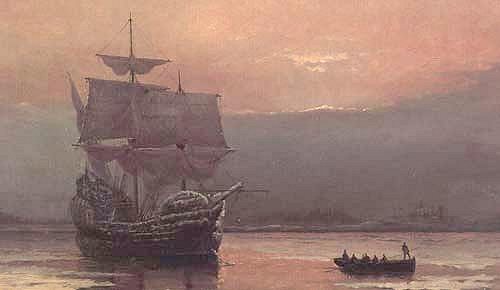
Mayflower in Plymouth Harbor leaving for America in 1620
|
The central tenet of Puritanism was God's supreme authority over human affairs, particularly in the church, and especially as expressed in the Bible. This view led them to seek both individual and corporate conformance to the teaching of the Bible, and it led them to pursue both moral purity down to the smallest detail as well as ecclesiastical purity to the highest level. On the individual level, the Puritans emphasized that each person should be continually reformed by the grace of God to fight against indwelling sin and do what is right before God. A humble and obedient life would arise for every Christian. |
The Puritans were originally members of a group of
English Protestants seeking "purity" — further reforms or even separation from
the established church (Anglican Church) — during the Protestant Reformation. The single
theological movement most consistently self-described by the term "Puritan" was
Reformed or Calvinist and led to the establishment of the Presbyterian, Baptist,
and Congregationalist churches. The term was used by the group itself mainly in
the sixteenth century, though it seems to have been used often and, in its
earliest recorded instances, as a term of abuse.
During the reign of Charles I (1625-1649) Puritans were more often referred to
as
Dissenters. Since English Dissenters were
barred from any profession that required official religious conformity, Puritans
became instrumental in a number of new industries. They dominated the export/import business
and were eager to colonize the New World. With the
flourishing of the trans-Atlantic trade with America, Puritans in England were
growing quite wealthy. Similarly, the artisan classes had become increasingly
Puritan, thanks to the Puritan emphasis on preaching and evangelizing.
Therefore, the economic issues of the Civil War (tax levies, liberalization of
royal charters), the political issues of the Civil War (purchasing of peerages,
increasing disconnect between the House of Lords and the people, rebellion over
the attempt to introduce a Divine right of kings to Charles I), and the
religious tensions were all bound together into a general dispute that pitted
Church of England Cavaliers against Puritan Roundheads. Puritans played
a key role in the Parliamentarian victory and became a majority in Parliament,
while Puritan military leader Oliver Cromwell became head of the English
Commonwealth.
The influence of the Puritan movement persisted in England as the Evangelical
faction of the Church of England, sometimes called "Low Anglican", while in the
United States the Puritan settlement of New England was a major influence on
American Protestantism.
|
Mayflower in Plymouth Harbor leaving for America in 1620 |
The Puritans were one branch of dissenters who decided that
the Church of England could not be reformed. Escaping persecution from church
leadership and the King, they went to America
(1620, Mayflower). Most of the Puritans settled in the New England area. As they
immigrated and formed individual colonies, their numbers rose from 18,000 in
1640 to 100,000 in 1700.
![]()
|
dissenter |
(az egyháztól) elszakadó, elpártoló |
credits:
The text was extracted from Wikipedia The Free Encyclopedia under GNU Free Documentation Licence.